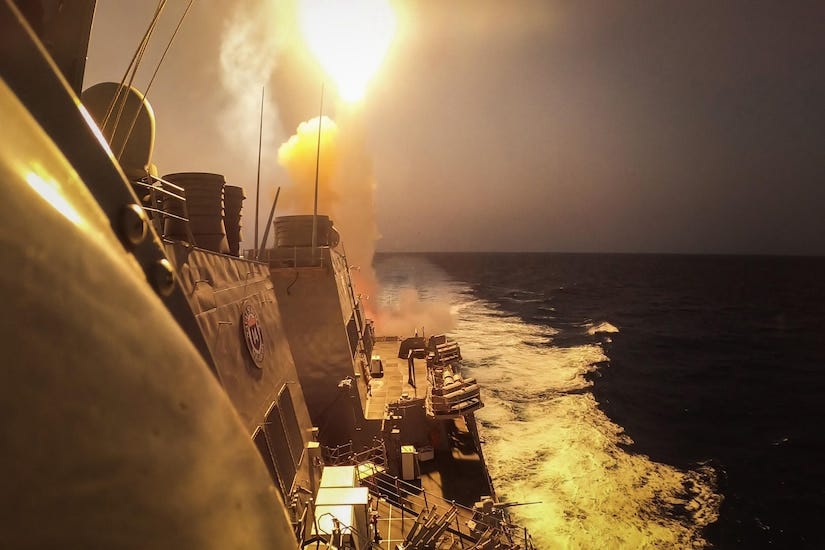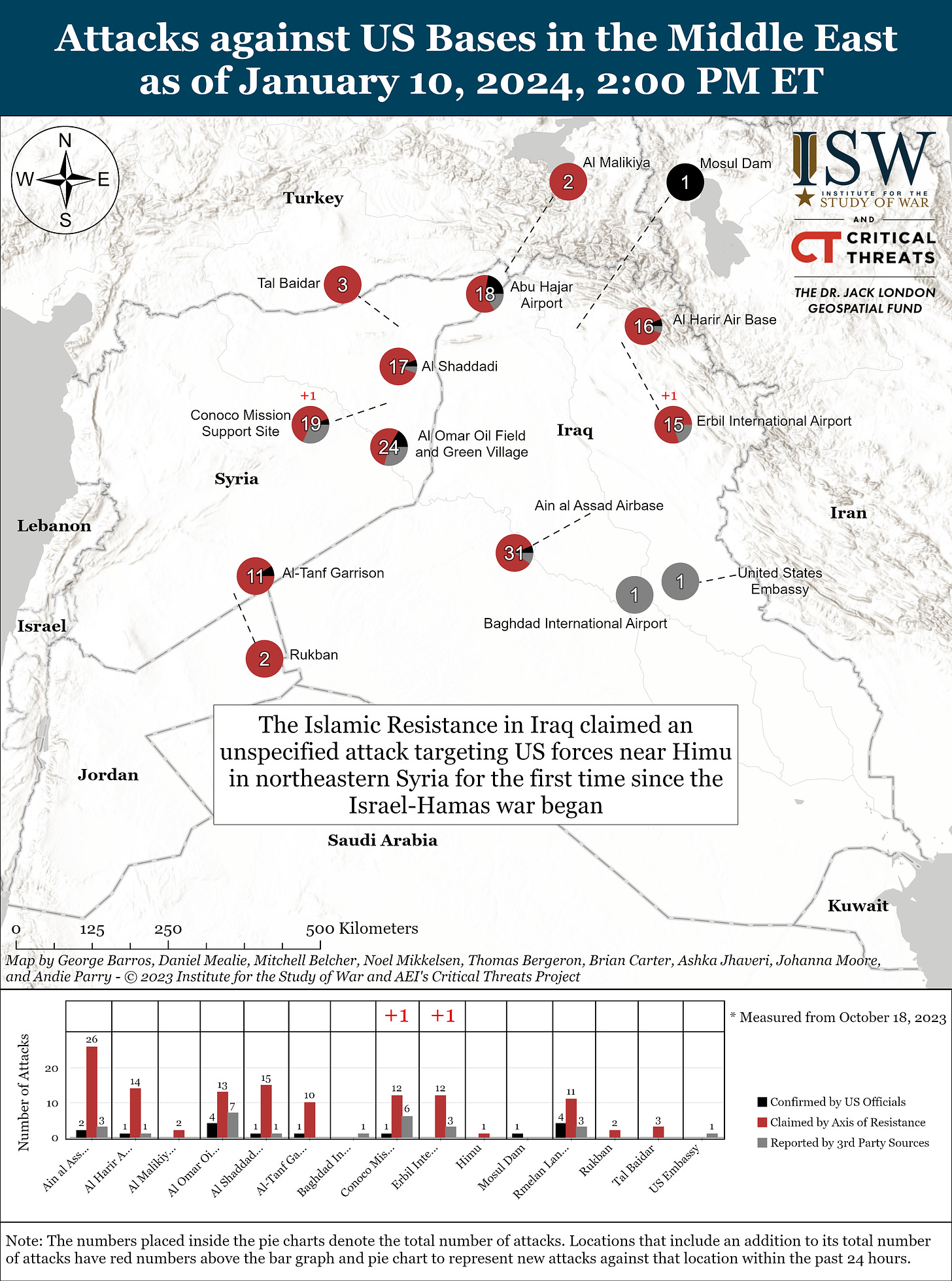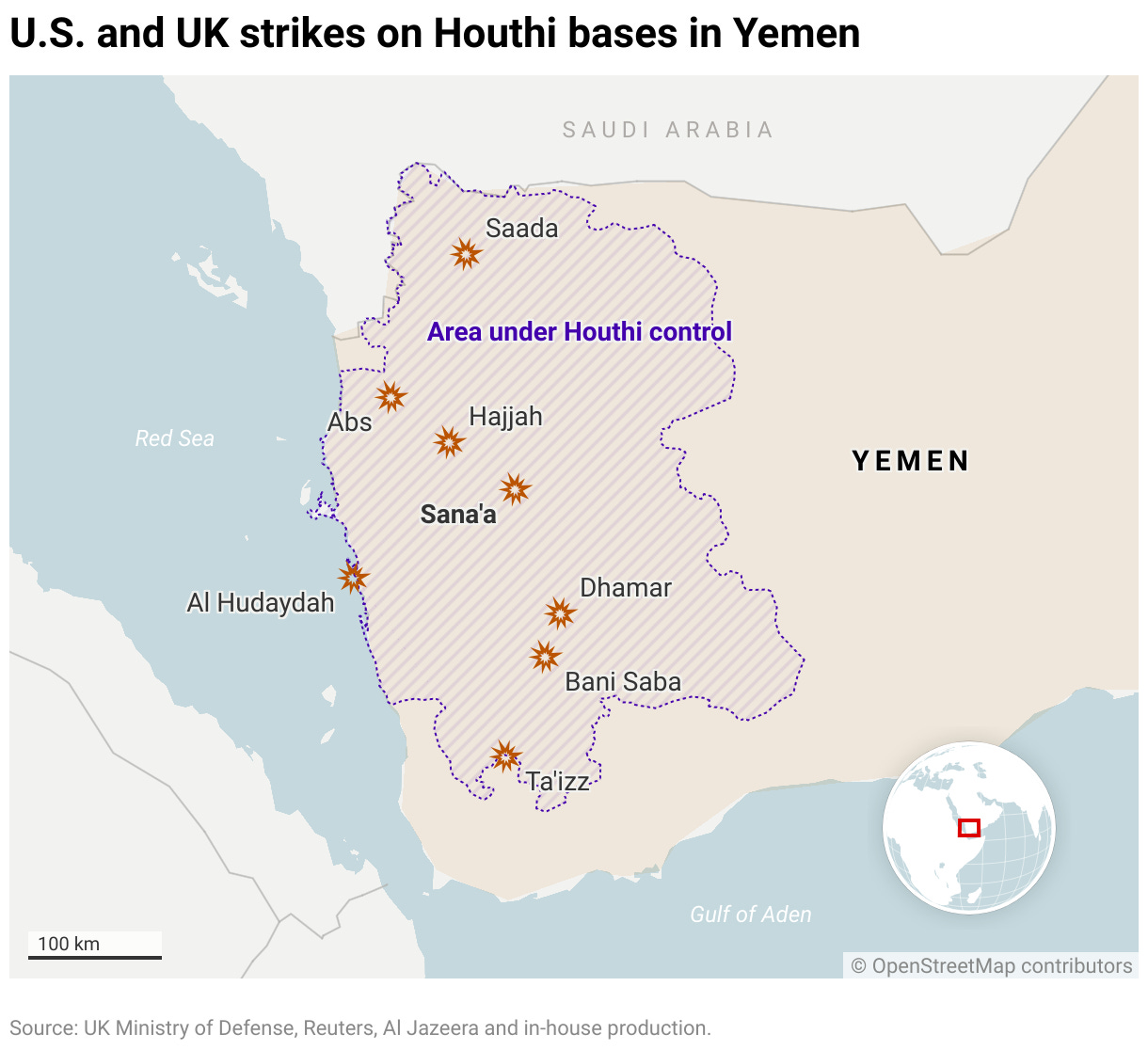Here is Antony Blinken’s itinerary for this past week, as published by the Department of State: “Secretary Antony J. Blinken will travel to Istanbul, Türkiye; Crete, Greece; Amman, Jordan; Doha, Qatar; Abu Dhabi, the United Arab Emirates; Al ‘Ula, Saudi Arabia; Tel Aviv, Israel; the West Bank; Manama, Bahrain; and Cairo, Egypt from January 4-11, 2024.” This list of stops does not even count his initial flight overseas from Joint Base Andrews in Maryland, or his return to the United States. You get my point: that’s one hell of a lot of travel over seven days.
Do you want to know what he was doing? He was talking, to national leaders, fellow secretaries of state or foreign ministers, representatives in touch with groups with whom we have no relations such as Hamas and the Houthis and Hezbollah and Iran, talking in fact with anyone who will listen or talk back.
It's what secretaries of state do, why they’re appointed to serve this country in office: because words are better than bombs, cheaper than bombs, and of course, words are not deadly, unless they convey deadly threats or intentions, such as a declaration of war.
That is the reason Antony Blinken made his lengthy and exhausting trip this week. The New York Times put it this way in a headline published just an hour ago: “White House seeks to contain Mideast War.” Just a few days ago, headlines on CNN and MSNBC and the Times and Washington Post spoke of containing or preventing “a wider war.” Now Blinken was sent over there because the White House and Department of State and the Pentagon are afraid that a region-wide war is about to ignite or has ignited already.
Just look at what has happened over the last 24 hours. U.S. and British war ships launched more than 150 missiles and bombs against 30 targets inside Yemen, the country that sits at the strategic strait of Bab-el-Mandeb, in English, “The Gate of Tears,” the narrow body of water between Yemen and Djibouti, with the Red Sea to its north and the Gulf of Aden to the south. I’ve lost track of the number of times that the U.S. has used weapons in the ongoing conflicts over there since the attack by Hamas on Israel on October 7. On October 26, we launched missile attacks on what were called “Iran-linked” targets in Syria. We launched another attack on militant bases in Syria and northern Iraq on November 12. On December 26, the U.S. used warplanes to hit three targets linked to the Iraq-based Kataib Hezbollah and “affiliated groups,” according to a White House statement at the time. The bombings were in response to drone attacks by Kataib Hezbollah on a U.S. base that injured three U.S. soldiers, wounding one critically.
By mid-November, there had been at least 52 attacks on U.S. bases by militant groups linked to Iran’s Revolutionary Guards, according to a statement released by the Pentagon. The number of attacks since then has not been released.
Remember what a big deal it was when then President Trump in 2018 ordered cruise missile strikes on a couple of empty air bases in Syria in response to Syrian use of chemical weapons against anti-Assad rebels? Have a look at this map from the Institute for the Study of War showing U.S. strikes in Iraq, Syria, Jordan, and even one in Turkey in retaliation for the attacks on U.S. bases and interests.
Now have a look at the map of the missile strikes on Houthi targets in Yemen yesterday.
With multiple attacks in multiple countries, this is starting to look like a war.
Militant groups like Hezbollah, the Houthis, Hamas and ISIS, which also has fighters in Iraq, Syria, and Yemen, are powerless when it comes to using their words, or believe they are. There are many reasons this is true, among them the amount of money they have, which in comparison to western nations is negligible. They are not represented in international forums such as the U.N., where words are the currency of nations. And their goals, expressed in words, exceed their power to achieve them. Hamas has the stated goal of killing all the Jews in Israel and occupying all land “from the river to the sea,” in its now infamous slogan. The slogan of the Houthi movement is “God Is the Greatest, Death to America, Death to Israel, A Curse Upon the Jews, Victory to Islam.” The Houthis, part of a Shiite sect called the Zaidis, have been fighting the Sunni government of Yemen for two decades.
It's beyond the ken of this column to go into who supports who, who’s been bombing who, which lands in Yemen are held by the Houthis, which are held by the government, which are held by Al-Qaeda and ISIS…there is even a part of Yemen held by something called the Southern Transitional Council, backed by the United Arab Emirates, according to the Institute for the Study of War.
But when you add the Houthis in Yemen, until recently not a major factor in the Middle East, to the violent situation in Iraq and Syria, where Sunnis and Shiites are still at each other’s throats, along with the Kurds, who hate all of them, and the Shiite Iranians, sitting back and pulling strings all over the place through Hezbollah and Hamas and God-only-knows how many smaller sects, and the Russians, who still have major interests in Syria, you can see what Blinken was up against this past week.
Blinken was using words, as missiles launched and bullets flew and bombs fell all around him.
Antony Blinken is over there trying to talk to the Israelis about reducing their attacks in Gaza, and somehow starting to bring their war with Hamas to an end and getting the hostages released, and he’s talking to the Gulf states like Qatar that have pull with Hamas, and this proposal is being floated and that one, the latest involving some kind of deal for a cease fire and release of hostages and Hamas leaders being given passage to go into exile in some unmentioned foreign country, and how many countries do you think are signing up for that eventuality? And then the deal is off the table, if it was ever on the table to begin with.
Religious sects like the Sunnis and Shiites have been in struggles with each other for centuries. The militant groups that have formed around the religious sects have been at war with the West and with each other for decades. The land on which the most recent wars, including the ones going on right now in Yemen, Iraq, and Syria, has been fought over for millennia.
None of it is ending anytime soon. Antony Blinken knows it. Every national leader in the Middle East knows it. Every militant leader knows it.
Blinken gets on an Air Force passenger jet and flies over there and meets with leaders in all those countries, or more bullets fly and despite his efforts, more bombs are dropped and more missiles are launched and more bullets fly somewhere over there every day anyway.
In the war between bombs and words, bombs are winning. With Russia in Ukraine threatening a new world war in Europe, radical Islamic groups attacking Western interests in Iraq and Syria and Jordan, and the Houthis disrupting international trade with kamikaze drones and anti-ship missiles and attack boats, what choice do we have?






We are fortunate to have Biden in office and Blinken working his ass off in an attempt to keep this as localized as possible, but it remains to be seen of course. Let’s watch and see if Iran loses its fkkg mind and invites a response.
If it’s not obvious to anyone the strategic importance of Israel (albeit partially crippled by the corruption of Netanyahu and Putin’s gleeful shitkicking) then you haven’t been paying attention). Our Mediterranean bases long gone, what other nation stood - and stands - fast with democratic interests. October 7 was not only a barbaric attack on innocents it was the opening move in what we’re seeing now. Were left to watch the outcome of this chess game.
History tells us straight out. Trade will not be disrupted without a response. The frosting is the religious zealotry that camouflages the intent.